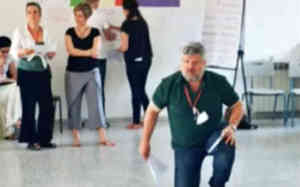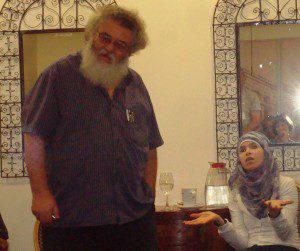My recent book In Pursuit of Peace in Israel and Palestine describes my attempts throughout the past 38 years to bring Jews and Arabs together constructively exploring in partnership how to make peace. While the book does focus on what went wrong and how we failed to make peace, it describes, in depth, how we could succeed. That is my approach.
I remain convinced that Israeli-Palestinian peace is possible and that the compromises necessary to reach an agreement could be accepted by both sides – if we managed to change the climate and begin to develop more positive contacts. Eventually the parties will return to the negotiation table and if they negotiate in good faith, they will find solutions. And even after they sign a peace treaty, both sides will need to work very hard to develop and build contacts and partnerships – and that will take years.
Adopting that approach, I would like to be optimistic and constructive. There are many Israelis and Palestinians who are swimming against the tide and continue to be committed to working together to find solutions to the conflict and to build partnerships today. The following is a brief description of some of the joint Israeli- Palestinian organizations that are shining forth in the darkness that has surrounded us for too long.
The first is IPCRI – Israel Palestine Creative Regional Initiatives – this is the organization I founded in 1988 and co-directed for 24 years. I have been co-chairman of the board of directors since 2012. IPCRI is dedicated to working as an in-house Israeli-Palestinian partnership organization in support of the two-state solution.
IPCRI’s latest initiative is in renewing joint Israeli-Palestinian working groups of civil servants from government ministries on both sides. This was a focus activity for many years, yet today there are also no contacts at all between Israeli and Palestinian government officials.
The Geneva Initiative and the Palestinian Peace Coalition provide realistic and achievable solutions on all the core issues in conflict, based on previous official negotiations, international resolutions, the Quartet Roadmap, Clinton Parameters, Bush Vision, and Arab Peace Initiative.
These Israelis and Palestinians work to re-instill in the Israeli and Palestinian peoples the hope that it is possible to reach an agreement that will serve their respective national and personal interests and aspirations.
They are committed to exposing each side’s public to the message of the other – despite the technical and psychological barriers.
Combatants for Peace was founded by Israeli and Palestinian former combatants, people who had taken an active role in the conflict and decided to lay down their weapons. Committed to joint nonviolence since its foundation, CFP works to both transform and resolve the conflict by ending Israeli occupation and all forms of violence between the two sides and building a peaceful future for both peoples. In keeping with their values, they work toward a two-state solution in the 1967 borders, or any other mutually agreed upon solution that will allow both Israelis and Palestinians to live in freedom, security, democracy and dignity in their homeland.
Standing Together is an Israeli movement of Jews and Arabs, who, guided by the principles of peace, equality and social justice, aim to create social change in Israel.
Standing Together is a popular movement a social and political grassroots movement which is inclusive, pluralistic, activist-based, democratically operated, and that embodies socialist values. Standing Together brings new hope in that this movement is comprised of young people – Jews are Arabs from all over Israel.
Women Wage Peace, now more than 50,000 strong, is a movement led by Jewish and Palestinian women who work throughout the country to raise awareness and engage the public in a discussion about the feasibility of a political resolution. These women create opportunities for dialogue with individuals and groups through formal and informal meetings within the community.
The movement also organizes national events, such as demonstrations and protests, to pressure decision makers to work toward reaching a viable peace agreement.
One new area of focus is now devoted to having an ongoing and visible presence in the Knesset. Every Monday they come to the Knesset, dressed in white and turquoise, each week with women from a different part of the country, and bring their hope with them.
They meet with Knesset members from all factions and discuss with them the importance of promoting a political agreement and of including women in the decision making processes on issues of security.
One of my favorites, because of its success and the hope that it creates, is the Hand in Hand bilingual schools popping up all over the country. Hand in Hand brings together thousands of Jews and Arabs in six schools and communities throughout Israel. In Jerusalem, in the Galilee, in Wadi Ara, Tel Aviv-Jaffa, Haifa, Tira and Kfar Saba. With many more continually joining.
Hand in Hand is proving on a daily basis the viability of inclusion and equality for all citizens of Israel. The interaction and partnership between the Jewish and Arab citizens of Israel is a factor that could have a significant impact on future chances for peace between Israel and Palestine as well.
Perhaps the organization with the most moral and compelling message is Bereaved Families Supporting Peace, Reconciliation and Tolerance, which is probably the only peace movement in the world which does not want new members. The Parents Circle – Families Forum (PCFF) is a joint Palestinian-Israeli organization of over 600, all of whom have lost a close family member as a result of the prolonged conflict. Joint activities have shown that the reconciliation between individuals and nations is possible and it is this insight that they are trying to pass on to both sides of the conflict. Moreover, the PCFF has concluded that the process of reconciliation between nations is a prerequisite to achieving a sustainable peace. The organization thus utilizes all resources available in education, public meetings and the media, to spread these ideas.The above is a short list of the many efforts by Israelis and Palestinians to break out of the current deadlock.
Our collective struggle is long and hard, but we will prevail because there are many other people living between the Jordan and the Sea who are working together on a daily basis for the mutual benefit and interests of both peoples living in the Land of Israel/Palestine.




